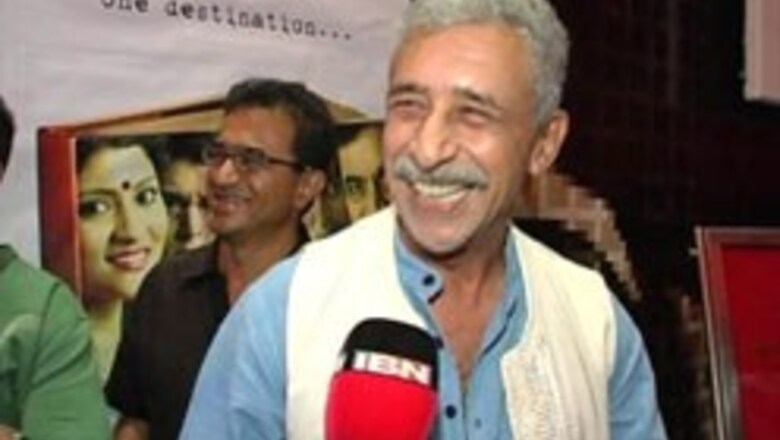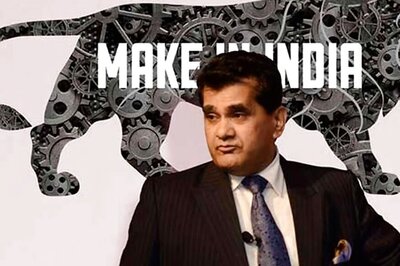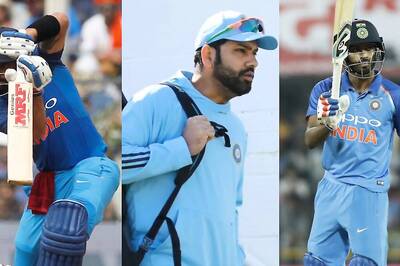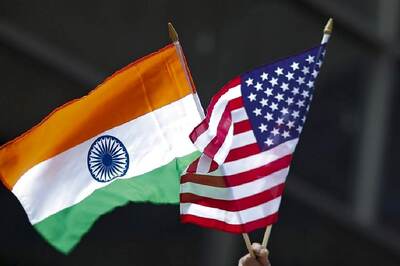
views
Cast: Paresh Rawal, Konkona Sensharma, Irfaan Khan, Jimmy Shergill, Ratna Pathak Shah, Ankur Khanna and Ayesha Takia
Direction: Naseeruddin Shah
Alright, so it's finally here. Naseeruddin Shah's debut film as director Yun Hota Toh Kya Hota is in the cinemas this week, and it's an ensemble drama about a bunch of people whose destinies are entwined by a single event.
The film tracks four separate stories whose protagonists cross paths at some point in the film, until the climax of course, which unites them all, and changes their lives forever.

In one of the film's four stories, Konkona Sensharma plays a young bride trying to make her way to America to be with her husband Jimmy Shergill who's gone back to his job in LA just days after their marriage in Mumbai.
In another story, young student Ankur Khanna has secured admission to an American university, but doesn't have the money to fund his first year of education in the US.
In the film's third track, stockbroker Irfaan Khan must flee the country when he gets accidentally involved in a murder he didn't commit. The timing's all wrong for him as he's still trying to figure out his exact feelings for an older woman he's involved with.
And in the film's fourth and most interesting story, Paresh Rawal, a small-time organiser of cultural shows in the US, must confront his feelings for old flame Ratna Pathak Shah when she approaches him with the request to include her daughter in his troupe.

Now, the film's biggest strength and its biggest draw undoubtedly is the fact that each story and each track is instantly relatable. You find you can identify with every single character and his or her dilemma because these are all real flesh-and-blood characters performed superbly by the actors, not caricatures or clichés that you're used to seeing in most masala Hindi movies.
PAGE_BREAK
I mean, think about it, who can't identify with a newly married girl who wants to get away from her insufferable in-laws and be with her husband in America? Or with the boy who's having problems choosing between his responsibility towards his ailing father and the promise of a brighter future in America?
What ultimately emerges the real hero of this film is its water-tight screenplay which moves at just the perfect pace, allowing each of the four tracks to criss-cross seamlessly, drawing you into its characters' lives and keeping you engaged throughout.
Now, a handful of Hindi movies recently have been inspired by Robert Altman's signature style of filmmaking - you know, several different story tracks that culminate in a common climax. Films like Yuva and Silsilay.

But truth be told, no film has been able to exploit the irony and the sheer coincidence of the common climax like Yun Hota Toh Kya Hota.
In earlier films, too much attention was drawn to the fact that so many stories were connecting at a common ending. Instead of allowing the viewer to admire the manner in which the story had been constructed, the films themselves indulged in a dramatic flourish to point this out.
But in Yun Hota Toh Kya Hota, it's done quietly and gently and as a result, it's you the viewer who relishes the manner in which fate is used to create that common ending.
Many of us, myself included, often point out the merits of American movies over Hindi pictures. I have often spoken about how Hollywood films tackle complicated and sensitive themes in a manner that Bollywood movies are afraid to. It's only fair then that I give credit where it's due.
PAGE_BREAK
Where Hollywood has been hesitant and reluctant to address the September 11 incident on celluloid, a Hindi movie has now gone and done it. In the West, only one film - Paul Greengrass' recent movie United 93 has retold that story.
In fact, Oliver Stone's film, titled quite aptly World Trade Centre is still many weeks away from release and there's a growing concern in Hollywood over how the audience will react to watching those events unfold before their eyes again.
But Naseeruddin Shah adopts a responsible approach to including that event in his story, and does so without creating any unnecessary sensation.
Putting their best foot forward to realise their director's dream, the cast of Yun Hota Toh Kya Hota perform magnificently.
Paresh Rawal steals the show with his carefully nuanced performance that taps into his character's mix of emotions.
Konkona Sensharma once again chews up the scenery every time she's on screen, adding those everyday touches to her character, making her a person so believable that you feel like you know her already.
Irfaan Khan conveys his character's dilemma so effectively that you're even willing to overlook the uncomfortable and disturbing relationship he shares with Suhasini Mulay —honestly the only low point in this film.
And Ankur Khanna, as the young student heading Westwards, conveys more through his silence than most actors do through words.
But in all fairness, even bit players like Saroj Khan, Ayesha Takia and Ratna Pathak Shah rise to the occasion and deliver superb performances. The credit for pulling off this enterprise so adeptly, then, must go to the captain of the ship himself, Naseeruddin Shah who tells such an engaging story in such an engaging manner.
Anyone who might have been afraid that a film directed by him could only be a grim and boring piece of pretentious art — because, let's face it, he has starred in some films like that — let me assure you, you will be very pleasantly surprised.
Yun Hota Toh Kya Hota is an engrossing and entertaining picture that says so much if you look real close. It's a film you have to watch. It marks an auspicious directing debut of one of India's finest living actors. And I can't wait for him to get behind the camera again.
Rating: 4 / 5 (Very Good)



















Comments
0 comment